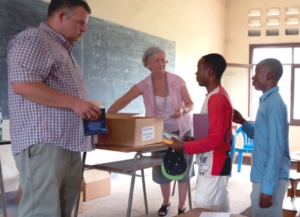SOU Computer Science Department gets new hires
Southern Oregon University’s Computer Science Department received a big boost this year with the hiring of two new professors – including a new department chair who will bring an international perspective to the program.
Daniel DeFreez and Fabrizzio Alphonsus Alves de Melo Nunes Soares joined the SOU Computer Science Department for fall term, with Soares transitioning from work and life in Brazil to a new experience as head of the SOU department.
“I am very excited about (computer science) in almost everything,” Soares said. “But I am very passionate about programming courses. I love to see a student smile when they realize that they can solve a problem. That makes my day.”
Soares worked as a professor of computer science, information systems and software engineering at Universidade Federal de Goiás in Goiânia, Brazil.
His research interests include computer vision, human-computer interaction, machine learning and programming topics. He is the leader of the Pixellab group, which develops solutions for accessibility, precision agriculture and interactive systems.
“Federal universities are free (in Brazil),” Soares said. “Therefore, to enroll in a major program at the university, students are submitted to a vast selection process, which only the students with the best grades under the cap get a seat.
“This looks good in some ways because we generally have outstanding students,” he said. “However, it is terrible, because in a country with such large social differences, students from lower classes have less access to good schools, and less chance to get good enough grades to access public universities.”
Being mindful of social models, and the ways in which people are disadvantaged by them, is one of Soares’ focuses. He worked on Project Braille Écran, a system to help blind and low-vision people use touch-screen smart phones. It proposed a number of solutions, including a screen protector with braille indents.
“(Braille Écran) is one of the most motivating research projects in which I worked,” Soares said. “Because if I can help a few blind people, even a single one, I think my work will be worth it.”
That kind of mindfulness is what drew Soares to SOU.
“In the past, I used to look at advertisements for professor positions to see what universities abroad required to hire a new faculty member,” he said. “I confess that many times I was very disappointed that the universities used to advertise positions based on numbers – the number of papers published, the number of projects, the number of grants, etc. It looks like they were not hiring a human being.
“When I saw the SOU position advertised, I read it slowly, and surprisingly, the advertising said that SOU was looking for a professor who teaches, cares about students, is concerned about diversity, and so forth – so here I am!”
Soares succeeded Peter Nordquist as the department head in computer science following Nordquist’s retirement.
“I think my plan (for the department) for the short-term is to understand the U.S. culture and educational system, SOU, the (computer science) department and the community, and to start to build a participative strategic plan,” Soares said. “In the medium-term, construct changes that can reflect our new team and local community and regional industry needs.”
Joining Soares on the computer science team this academic year is DeFreez – an SOU alumnus who received his master’s degree in mathematics and computer science in 2012. He received his bachelor’s degree in sociology from the University of Oregon and his doctorate in computer science from the University of California, Davis.
“Being an SOU student was a life-changing experience for me – that’s why I came back,” DeFreez said. “SOU is a special place with a real sense of community. Some of my longest-lasting professional and personal relationships were formed while I was a student here.”
His thesis, “Android Privacy Through Encryption,” proposed a way to modify a Linux/Android disk encryption software called eCryptfs to better protect a phone’s disk memory from hackers and investigators.
“There are a wide range of scenarios, from the dissident hiding from a dictatorial regime to the prying eyes of a stalker, where the successful use of forensic techniques may inflict grave injustice upon the owner of the object of analysis,” DeFreez said in his thesis. “In the face of untoward forensic inquiry, a person has little recourse other than to prevent forensic techniques from succeeding in the first place.”
DeFreez taught in the past as an adjunct at SOU, but this is his first year as an assistant professor and full-time faculty member. He is especially excited about teaching Programming Languages, which focuses on the interplay between the languages we use to speak to computers. He’s also looking forward to a spring term elective on software security.
Story by Blair Selph, SOU Marketing and Communications student writer











